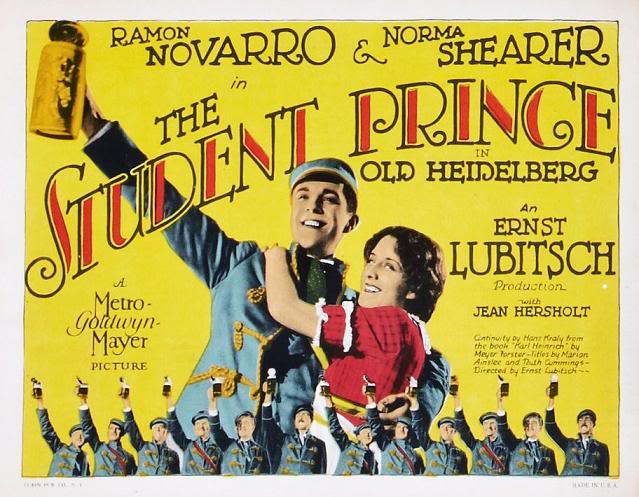This weekend, the Stanford Theatre officially kicks off their latest film festival, “The Best of Ernst Lubitsch,” with two rare Lubitsch silents: “The Student Prince in Old Heidelberg” (1927) and “Madame DuBarry” (1919).
“The Student Prince,” a sparkling American romance starring Norma Shearer and Ramon Novarro, plays on Saturday, Jan. 21, at 7:30 p.m.
“Madame DuBarry,” a German historical epic starring that great vamp Pola Negri and Emil Jannings (who starred in the two great “Last” silents: Murnau’s “Laugh,” Von Sternberg’s “Command”), plays on Sunday, Jan. 22, at 3 p.m.
Dennis James, the Wurlitzer organist who most regularly accompanies the Stanford’s silent-film screenings, will play at both shows.
The great film critic and director Peter Bogdanovich (“Paper Moon,” “The Last Picture Show”) is a huge lover of “The Student Prince.” In an IndieWire review, he calls it “a lightly told and devastating romantic heartbreaker.” Bogdanovich breathlessly reports rewatching Lubitsch’s 1927 film:
“About fifteen years later (after I myself had been through a tragic love affair), I saw ‘The Student Prince’ again and it killed me. I don’t believe I’ve ever seen a picture that as brilliantly (without words, remember) captures the intoxicated, overpowering feeling of two people falling in love as the first few scenes between Shearer’s tavern maid and Novarro’s title character. The gestures, body language and looks that pass from one to the other are astonishingly fresh and evocative – superbly modulated, choreographed, photographed and edited by the master at the top of his game.
“While he bewitchingly conveys the heady beauty of blossoming love, Lubitsch also quite devastatingly expresses the crushing anguish of lovers’ parting and loss. Seeing ‘The Student Prince’ brings with it a kind of shock of recognition: Yes, the movies really can tell you so much about human beings without the use of words … Lubitsch reminds us that once upon a time pictures were about feelings, and they had a heart.”
This silent rarity is a blueprint of the sparkling yet devastating romance, an elusive film genre later taken up by Jacques Demy (“The Umbrellas of Cherbourg”), Vincente Minnelli (“Gigi”) and William Wyler (“The Heiress”).
The films are part of the Stanford’s newest film festival, a program that celebrates the sumptuous and sexually/socially progressive works of Ernst Lubitsch. The master German director started his career in the 1910s, starring as himself in a series of Semitic comedies (“Meyer in Berlin,” “Pinkus’ Shoe Palace”) and directing some wild, transgressive farces (a highlight: the gender-bending “I Don’t Want To Be A Man!”).
He then moved to America in the mid-1920s, polishing silent diamonds like “The Marriage Circle” and an adaptation of Oscar Wilde’s “Lady Windemere’s Fan.” In 1929, Lubitsch made the smooth transition into sound cinema, pioneering two huge film genres that would forever come to define the classic American cinema: the musical (“Love Parade,” “Monte Carlo,” “Smiling Lieutenant”) and the romantic comedy (“Trouble in Paradise,” “The Shop Around the Corner,” and the Technicolor extravaganza “Heaven Can Wait”).
Lubitsch was never a safe, kitschy artist. In “To Be Or Not To Be,” his most astonishing American masterpiece, he dared to get huge laughs with lines like “So they call me Concentration Camp Ehrhardt, eh?!” We see traces of Lubitsch everywhere in the American popular arts: from Billy Wilder to Elaine May, from Whit Stillman to Woody Allen, from “I Love Lucy” to “Arrested Development” and “Bojack Horseman.”
Be sure to seek out “The Student Prince,” which is only available on an out-of-print VHS. “Madame DuBarry” is available, but watching a silent film on home video, backed with a usually generic honky-tonk-piano, doesn’t hold a candle to experiencing a silent film with live music in a theater, especially one with a whizzing whirligig like the Stanford’s Wurlitzer.
More Lubitsch films will be announced in the coming days. The festival started last weekend, continuing through all this week and tonight, with 7:30 p.m. screenings of Lubitsch’s 1942 anti-fascist masterpiece “To Be Or Not To Be.”
Contact Carlos Valladares at [email protected].
